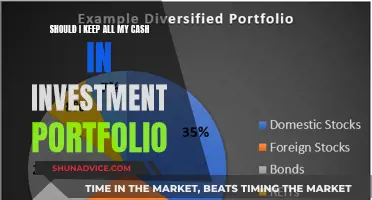
Equity-based investment products are a type of investment fund that pools money from investors to primarily buy a portfolio of stocks, also known as equity securities. Equity funds are often used in investment portfolios and give investors fractional ownership of companies via the shares they purchase in the fund. The main benefit of equity funds is that they offer investors a professionally managed, diversified approach to investing in stocks, with the potential for attractive long-term returns.
| Characteristics | Values |
|---|---|
| Definition | Investment fund that pools money from investors to trade primarily a portfolio of stocks |
| Other Names | Stock funds |
| Management Style | Actively managed or passive funds |
| Actively Managed Funds | Portfolio managers who actively research, analyze and select stocks with the goal of outperforming a benchmark index |
| Passively Managed Funds | Include index funds, which aim to replicate the performance of a specific market index |
| Market Capitalization | Large-cap funds, mid-cap funds, small-cap funds |
| Investment Style | Growth funds, value funds, blend equity funds |
| Sector and Geographic Specialization | Sector funds, geographically focused funds (domestic, international, global, emerging market funds) |
| Benefits | Diversification, professional management, superior returns |
| Risks | Market risk, volatility, losses |
| Taxation | Short-term capital gains, long-term capital gains, qualified dividends, non-qualified dividends |
What You'll Learn
- Equity funds: Pooled investments that primarily buy stocks listed on major exchanges
- Actively managed funds: Attempt to beat the market, with higher fees
- Passively managed funds: Attempt to match the market, with lower fees
- Direct equity investments: Buying shares/stocks of a company without a manager
- Equity mutual funds: Well-diversified, professionally-managed, and ideal for investors with limited knowledge

Equity funds: Pooled investments that primarily buy stocks listed on major exchanges
Equity funds are a type of investment fund that pools money from multiple investors to buy stocks, also known as equity securities. These funds are also known as stock funds due to their focus on investing in stocks. Equity funds are pooled investments that primarily put money into stocks listed on major exchanges.
Equity funds are managed by fund managers, who aim to generate returns for the investors. They offer a professionally managed and diversified approach to investing in stocks, with the potential for attractive long-term returns. While investing in stocks is riskier than some other investments, equity funds can diversify with stocks from many different companies, thus protecting investors from the risk of one or more stocks underperforming.
Equity funds are often categorized based on the size of the companies they invest in. They can be actively managed or passively managed. Actively managed funds have portfolio managers who actively research, analyse and select stocks with the goal of outperforming a benchmark index. Passively managed funds include index funds, which aim to replicate the performance of a specific market index.
Equity funds provide investors with several benefits, including diversification, professional management, and the potential for superior returns. However, they also come with the risks associated with stock market volatility and losses.
Equities: A Smart Investment Choice?
You may want to see also

Actively managed funds: Attempt to beat the market, with higher fees
Actively managed funds are a type of investment product where a portfolio manager or a team of managers makes decisions about buying and selling securities to attempt to beat the market. These funds often come with higher fees and expenses compared to passively managed funds, such as index funds, which aim to track the market performance of a particular benchmark or index. The higher fees associated with actively managed funds can eat into the returns and make it more challenging to outperform the benchmark.
Actively managed funds offer the potential for greater returns by leveraging the expertise of portfolio managers who can adapt to changing markets and select investments with the aim of outperforming the market. These funds provide an opportunity to maximise returns, beat benchmarks, and benefit from the human touch. The managers of these funds conduct in-depth research to identify undervalued stocks and produce better returns than index funds, enhancing investors' portfolios.
Fidelity, for example, has a long history of demonstrating the success of active management, spanning over 70 years. They have a team of over 170 global research analysts and portfolio managers who work to identify investments with the potential to outperform. At Fidelity, 87% of their equity funds have outperformed their benchmark over the manager's tenure.
Actively managed funds also introduce additional complexity and require more time and attention from investors. The varying fees and expenses across multiple investments can be challenging to track and understand, making it burdensome for investors to make informed decisions. It is important for investors to carefully consider the potential impact of fees on their portfolio performance and their investment goals.
Overall, actively managed funds offer the potential for higher returns but come with higher fees, adding a layer of risk as the portfolio manager may underperform the benchmark. Investors need to weigh the benefits of potential outperformance against the higher fees and increased complexity associated with actively managed funds.
Crude Oil ETF: A Guide for Indian Investors
You may want to see also

Passively managed funds: Attempt to match the market, with lower fees
Equity-based investment products are a type of investment in which money is invested in a company by purchasing shares of that company on the stock market. These shares are typically traded on a stock exchange. Equity investors purchase shares of a company with the expectation that they will increase in value, resulting in capital gains and/or dividends.
One type of equity-based investment product is passively managed funds, which are a popular choice for investors seeking a hands-off approach. These funds aim to match the performance of the market or a specific index, such as the S&P 500, without actively hunting for investments. The fund manager follows the chosen index and does not have discretion in selecting investments. This passive approach has several benefits, including lower fees and reduced management risk.
Lower fees are a significant advantage of passively managed funds. By following a predetermined index, these funds minimise the costs associated with research and analysis. They also reduce fees by lowering the number of trades, as the fund only needs to buy and sell when the index changes. The larger size of passively managed funds also contributes to lower fees due to economies of scale.
Another benefit of passively managed funds is the reduced management risk. By removing the need for active decision-making, these funds lower the chance of fund managers making poor or untimely choices. This passive approach also aligns with standard investing advice, such as diversifying your portfolio and avoiding emotional decisions.
While passively managed funds offer lower fees and reduced risk, they may not be suitable for everyone. These funds aim to match the market rather than outperform it, so they may not appeal to investors seeking higher returns. Additionally, the lack of flexibility in passively managed funds can be a disadvantage, as they are limited to a specific index or set of investments.
Overall, passively managed funds offer a straightforward approach to investing with lower fees and reduced management risk. They are a popular choice for conservative investors who want to match the market's performance without taking on additional risks.
Blockchain Investment in India: A Beginner's Guide
You may want to see also

Direct equity investments: Buying shares/stocks of a company without a manager
Equity-based investment products are a way to invest money in a company by purchasing shares of that company on the stock market. These shares are typically traded on a stock exchange. Equity investors buy shares with the expectation that their value will increase, resulting in capital gains, or that they will generate capital dividends. If the value of the equity investment rises, the investor can sell their shares to receive the monetary difference, or the company's assets can be liquidated and the investor will receive the difference if all its obligations are met.
Direct equity investments refer to the acquisition of ownership in a company's shares or stocks by an investor. When an individual or institutional investor purchases shares of a company, they become a shareholder or stockholder, meaning they own a portion of that company. Direct equity investments can be made by buying shares/stocks of a company without a manager, and this can be done through a direct stock plan (DSP).
Benefits
Direct equity investments offer the potential for higher returns compared to other investment options. As a shareholder, you have the opportunity to benefit directly from the company's growth and success. If the company performs well, the value of your investment can increase significantly over time.
Control and Flexibility
Direct equity investments give you control over which companies you want to invest in. You can choose the companies you believe in and align with your investment goals. This flexibility allows you to build a diversified portfolio tailored to your preferences.
Voting Rights
As a shareholder, you may have voting rights and the opportunity to attend annual general meetings. This gives you a say in the company's decision-making process and allows you to influence its direction.
Risks
One of the main risks of direct equity investments is the volatility of the stock market. Stock prices can fluctuate in response to economic conditions, company performance, and market sentiment. This can result in temporary losses or gains, depending on the timing of your investments.
Company-Specific Risks
Direct equity investments also expose you to specific risks associated with each company you invest in. For example, a company may face industry-specific challenges, regulatory changes, or management issues that can impact its financial performance.
Liquidity Risk
Unlike other investment options such as bonds or mutual funds, direct equity investments may have lower liquidity. It may not be easy or quick to sell your shares if you need immediate access to your funds, especially during times of market turmoil.
Steps to Investing in Direct Equity
- Educate yourself about the stock market, investment strategies, and the companies you're interested in.
- Define your investment goals, such as capital appreciation, dividend income, or a combination of both.
- Open a brokerage account with a reputable brokerage firm that suits your needs, considering factors such as fees, customer service, and available research tools.
- Diversify your portfolio by spreading your investments across different companies, industries, and geographic regions to reduce risk.
- Monitor and review your investments regularly, staying updated on market trends and company news.
Popular Direct Equity Investment Strategies
- Value Investing: Identifying undervalued companies whose stock prices don't reflect their intrinsic value.
- Growth Investing: Focusing on companies with high growth potential that reinvest their earnings.
- Dividend Investing: Prioritizing companies that consistently pay dividends for regular income.
- Sector Rotation: Rotating investments across sectors based on market conditions and allocating funds to sectors expected to outperform.
Smart Investment Strategies for 50 Lakh INR in India
You may want to see also

Equity mutual funds: Well-diversified, professionally-managed, and ideal for investors with limited knowledge
Equity mutual funds are a type of investment fund that pools money from multiple investors to purchase a diversified portfolio of stocks. They are an ideal investment product for those with limited knowledge of investing for several reasons.
Firstly, equity mutual funds are well-diversified. They invest in a wide range of stocks across different sectors and industries, reducing the risk associated with investing in individual stocks. This diversification ensures that the impact of any single stock's performance on the overall fund is minimised. Most funds hold 40-50 stocks in their portfolio, reducing the risk for investors.
Secondly, equity mutual funds are professionally managed. A team of professionals selects the stocks, aiming to deliver maximum returns while controlling risk. These fund managers are experts in markets and finance who conduct thorough research and analysis to make investment decisions. They continuously monitor the performance of the companies they invest in, as well as the sectors in which they operate, the economy, and other crucial factors that can influence stock prices. This allows them to make tactical investment decisions and handle market volatility effectively.
Lastly, equity mutual funds are ideal for investors with limited knowledge because they provide a relatively hands-off approach to investing. Once an investor has chosen a fund that aligns with their goals, risk tolerance, and investment horizon, the fund manager takes care of the rest. The investor does not need to have expertise or spend time researching individual stocks, as the fund manager and their team handle the investment decisions and actively manage the portfolio.
Equity mutual funds offer a convenient way for investors with limited knowledge to gain exposure to a diversified portfolio of stocks, with the potential for higher returns than other investment options. However, it is important to remember that equity mutual funds are subject to market risk and can experience short-term fluctuations and volatility. Therefore, investors should be prepared to stay invested for the long term to reap the benefits of equity mutual funds.
Investment Portfolio Strategies: Corporations' Key Considerations
You may want to see also
Frequently asked questions
Equity-based investment products are those in which the investor buys shares/stocks of a company, becoming a partial owner of that company. The investor's money is used to purchase these shares, which are then traded on a stock exchange.
Equity investors can make money through dividends, capital gains, share buy-backs, discounts on new purchases, and free/bonus shares. Dividends are distributed profits from the company, while capital gains come from selling holdings at a higher market value. Share buy-backs allow investors to sell shares back to the company at a higher price, and discounts on new purchases incentivize investors to buy more shares. Finally, some companies release free or bonus shares when they realize exceptional profits.
Equity-based investment products offer the potential for high returns and capital gains. They also provide investors with diversification, allowing them to spread their investments across multiple companies and sectors. Additionally, equity investments give investors voting rights and the ability to influence corporate actions and board elections.
Equity investments carry market risk, performance risk, liquidity risk, social/political/legislative risk, and currency/exchange rate risk. Market risk refers to the potential for economic downturns or geopolitical events to impact stock prices. Performance risk is when individual stocks or sectors underperform, and liquidity risk is the difficulty of selling an investment at a fair price during emergencies. Social/political/legislative changes can also affect company performance, and currency fluctuations can impact earnings for companies with foreign operations.







